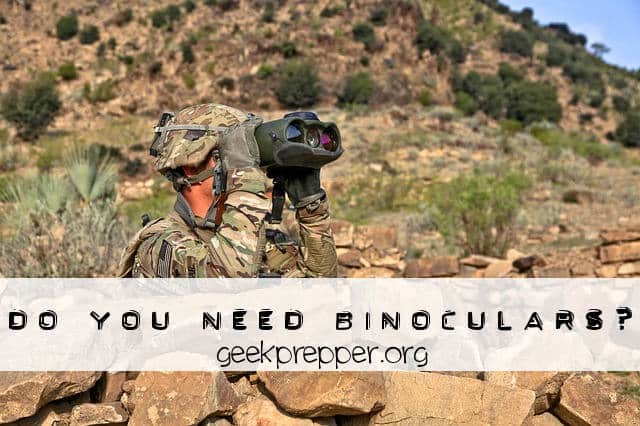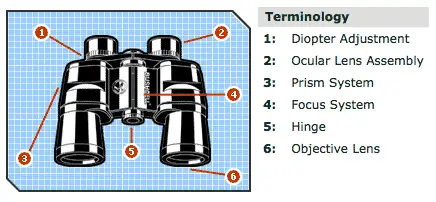I’ve seen some discussion where people discount the need for binoculars in your preps.
They go as far to claim that they waste space and add unneeded weight in their bug out bags or gear.
Those people are wrong you do need Binoculars for preparedness.

Do You Need Binoculars for Preparedness
Quality binoculars are a must for any Prepper and will they will prove valuable on a daily basis.
Military Scouts utilize binoculars for scouting and recon missions. While ships are at sea and underway, the crew use binoculars regularly, almost hourly, if not more often.
Why do you need binoculars?
- To regularly scout your path ahead for people, situations or ambushes.
- To regularly monitor your surroundings when encamped, hunkered down, or at your retreat
- To gather recon about game animals, and supplies in your area
- To see through dense cover and help you identify what is behind the cover in the areas around you
If moving after SHTF, it will most likely be at night, but if I do have to move in the day, I’ll be utilizing good cover. By using binoculars, I can focus though brush and cover will allow me to see what is ahead.
If we are holed up for the day, binoculars will help us over-watch our position far easier
Can’t I just use my rifle scope instead of binoculars?
A rifle scope is NOT a good substitute for binoculars, unless there is no other choice, and sometimes there is no other choice.
I can think of some reasons why you wouldn’t want to use your rifle scope as your only optic.
- If you are trying to identify unknown objects, those objects could turn out to be a humans. People tend to dislike having weapons pointed at them and may consider you pointing a weapon at them as a threat (geeze, people are so sensitive, sometimes).
- It’s easier to focus and detect movement using 2 eyes. Using both eyes is far less fatiguing. The human eye is conditioned to notice movement, but you will need the ability to discern if that is a wolf or a person crawling towards you and regardless of your cover binoculars will make that simpler.
- You can scan the area with less movement than moving your long, scoped rifle around, decreasing your chances of being spotted and saving energy
- Larger field of view, increasing the speed of searching/scanning your area.
Buying Tips to keep in Mind
- If you can afford higher quality binoculars, then don’t buy the cheap binoculars, it’s a mistake.
- Stick with the major brands: I happen to like Fujinon, Bushnell and Nikon binoculars.
- Larger body binoculars (which have larger lenses) can collect more light and will work much better in low-light conditions, allowing you to see objects, once your eyes are adjusted to the low light conditions. These are usually heavy.
- Compact binoculars are lighter and easier to carry, but they don’t provide the benefits of use in lower light conditions, so there is a trade off.
What you really need to know about Binoculars, before you buy:
- Objective lens sizes – The bigger the Objective lens size, the more light they take in, and the better they perform in low-light. Keep in mind, the bigger lenses are, the heavier they are, and the more expensive the binoculars are.
- Prisms – Porro prism binoculars are typically larger and heavier, but perform better at lower price points. Roof prisms may be more compact, but are often more expensive. Porro prisms are often great as a first set of binoculars, while Roof prisms will be in the binoculars that last a lifetime.
- Coatings – Coatings can dramatically improve image quality, and can even compensate for other features that are lacking. Fully multi-coated binoculars are treated with coatings on every air-to-glass surface, making them the best quality.
- Glass type – The two main types of glass, used in binoculars. They are BK-7 and BAK-4. BAK-4 is recognized as higher quality, but can be more expensive. If you want to invest in the best quality binoculars possible then BAK-4 is the best choice. If you want to buy a backup pair of binoculars, or a set for your kids then the BK-7 would be adequate.
- Magnification – It would seem that higher magnifications would make for better binoculars, but this is not always so. Do buy binoculars just because they have higher magnifications. The higher the magnification, the smaller the area you can view at once. Higher magnification also makes it more likely that your image will be distorted by even the slightest shaking of your hands. 8x and 10x are fine for most uses, and are preferred by hunters.
- Focusing – Both center focusing and independent eye focusing are available. You need to try out both focusing mechanism in-store to compare how they works and how easy it is to use. Since we’re getting these for SHTF, you’ll need to be able to focus in on objects quickly.
- Armor and Eye cups – Comfort is usually the least appreciated aspect of using binoculars, yet it is important. You’re not going to use those binoculars if they hurt your eyes after a few minutes, or are too heavy to hold up comfortably.
- Extras – Some Binoculars are available with a lighted compass and ranging scales.
- Waterproof – Trust me. I have a couple pairs of binoculars that decided to take a swim. They are never really the same after that. Spend a bit more and get water proof binoculars.
Which Binoculars did I choose?
I am a fan of the compact binoculars. I have the Bushnell Waterproof Compact Roof Prism Binoculars (10 x 25-mm), but will soon be moving to the next size up, the Bushnell Waterproof Compact Roof Prism Binoculars (8 x 42-mm or 10×42-mm). As you might have noticed, I have waterproof binoculars, because I will drop them in the water, or forget they are with me when I cross a river or swim. It never fails!
A good set of binoculars in your bug out bag, get home bag, or preparedness gear can go a long way and may just give you a good advantage, if you take the time to observe before you move, and use them to speed up your recon and location of supplies!

Hi,
Glad to see you recommend a good pair of binoculars. Bushnell is a good brand. There are several others like Vortex, Leica, and Zeiss that are excellent choices too.
What do you think about the Bushnell Legend Ultra monocular, it’s not a binocular, but in terms of portability and quality this seems to be a good option. I would like to hear things from your perspective, would you recommend a monocular over a binocular when it comes to portability, also it’s just a hobby, nothing too serious. The review on this particular monocular stated that it’s the best in terms of quality and waterproofing (https://www.outeroptics.com/best-monocular/), just not sure if I should purchase it or not.
If you’re gonna get a monocular, you might as well get a nice rangefinder for a couple of hundred bucks.
Agree, monocular only advantage over bino is reducing weight and volume taken in your bag, but modern rangefinders usually can do same stuff as monoculars and even more on top. Still, those are more bulky and in general heavier compared to monoculars though.
Hi, thanks for your very detailed sharing. I am looking for a binocular but the one with the night vision feature. And I consider between your suggestion “Bushnell H2O” and the “Aurosports Folding High Powered”. What do you prefer between them?